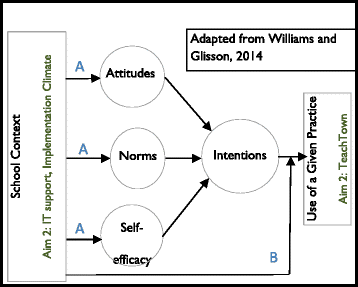Study protocol: implementation of a computer-assisted intervention for autism in schools: a hybrid type II cluster randomized effectiveness-implementation trial
- PMID: 27884169
- PMCID: PMC5123389
- DOI: 10.1186/s13012-016-0513-4
Study protocol: implementation of a computer-assisted intervention for autism in schools: a hybrid type II cluster randomized effectiveness-implementation trial
Abstract
Background: The number of children diagnosed with autism has rapidly outpaced the capacities of many public school systems to serve them, especially under-resourced, urban school districts. The intensive nature of evidence-based autism interventions, which rely heavily on one-to-one delivery, has caused schools to turn to computer-assisted interventions (CAI). There is little evidence regarding the feasibility, effectiveness, and implementation of CAI in public schools. While CAI has the potential to increase instructional time for students with autism, it may also result in unintended consequences such as reduction in the amount of interpersonal (as opposed to computerized) instruction students receive. The purpose of this study is to test the effectiveness of one such CAI-TeachTown-its implementation, and its effects on teachers' use of other evidence-based practices.
Methods: This study protocol describes a type II hybrid cluster randomized effectiveness-implementation trial. We will train and coach 70 teachers in autism support classrooms in one large school district in the use of evidence-based practices for students with autism. Half of the teachers then will be randomly selected to receive training and access to TeachTown: Basics, a CAI for students with autism, for the students in their classrooms. The study examines: (1) the effectiveness of TeachTown for students with autism; (2) the extent to which teachers implement TeachTown the way it was designed (i.e., fidelity); and (3) whether its uptake increases or reduces the use of other evidence-based practices.
Discussion: This study will examine the implementation of new technology for children with ASD in public schools and will be the first to measure the effectiveness of CAI. As importantly, the study will investigate whether adding a new technology on top of existing practices increases or decreases their use. This study presents a unique method to studying both the implementation and exnovation of evidence-based practices for children with autism in school settings.
Trial registration: NCT02695693 . Retrospectively registered on July 8, 2016.
Keywords: Computer-assisted intervention; De-implementation; Effectiveness-implementation trial; Exnovation.
References
-
- American Psychiatric Association . Diagnostic and statistical manual of mental disorders, 5th edition: DSM-5. Arlington: American Psychiatric Association; 2013.
-
- US Office of Special Education Programs. www.ideadata.org. 2010. Accessed 1 Apr 2011.
-
- National Autism Center. The National Standards Report. 2009. Retrieved January 16, 2016 from http://www.nationalautismcenter.org/pdf/NAC%20NSP%20Report_FIN.pdf.
-
- Lord C, McGee J. Educating children with autism. Washington, DC: National Academy Press; 2001.
-
- Government Accountability Office . Special Education: Children with Autism. Washington, DC: United States Government Accountability Office; 2005.
Publication types
MeSH terms
Associated data
Grants and funding
LinkOut - more resources
Full Text Sources
Other Literature Sources
Medical
Research Materials


